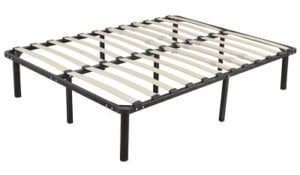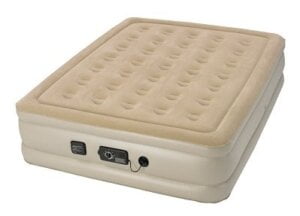Last updated on 27 July, 2023
How To Keep An Air Mattress From Deflating - 10 Working Tips
– By Eric Smith

Sleeping can be very annoying if the inflatable bed has air losing problem. But don’t worry, it is a common issue that one faces while using an air mattress.
Almost all airbed lose a little air which is quite usual. However, if you think your one is losing much air, such as deflates in 40-50 minutes or even less after the inflation, then it should be a dilemma for you.
There can be many reasons for an airbed not being able to hold the air, and in this guide on how to keep an air mattress from deflating, we will discuss all measures you can take to stop your airbed from deflating too fast.
Also, we will discuss why an air mattress starts losing air unusually so that next time you don’t make any mistake while using it.
Quick Overview
- How To Keep An Air Mattress From Deflating - 10 Working Tips
- How To Keep An Air Mattress From Deflating
- Why Do Air Mattresses Deflate Overnight?
- FAQs - How to Keep an Air Mattress From Deflating
- Wrapping Up:
- How To Inflate an Air Mattress With Air Compressor? 4 Easy Steps
- Can You Wash an Air Mattress? How To Do That?
- Can You Leave an Air Mattress Plugged In? Know The Truth
- Why Do Air Mattresses Have Bumps? 5 Shocking Reasons
- Why Is My Air Mattress Making Popping Noise? 10 Reasons
- Can You Stack Air Mattresses? – 5 Best Tips(2023 Guide)
How To Keep An Air Mattress From Deflating
#1. Locate The Tiny Leak:
The most common reason why an air mattress keeps on deflating is the tiniest leak which is quite tricky to locate and fix. And, there are high chances that your airbed is also suffering from this issue.
Many times in a hurry, we forget to clean the area before setting up the air mattress. As a result, it starts leaking, coming into contact with tiny debris, and we keep on looking for the problem.
So, whenever you feel that something is wrong with your bed’s air-holding ability, you first have to look for a leak and patch it as soon as possible.
But like I said, sometimes it can’t be found with bare eyes, so you may need to use some other methods such as a soapy-water trick.
#2. Inspect The Valve:
Another most common reason for the air mattress leak is a defective inflation valve.
After long or lousy use, most blow-up bed valves start losing their grip from the joints, because of which the air gets the easy way to move out. So, check whether the valve is in perfect condition and change if needed.
This problem also happens when an airbed is being inflated and deflated frequently. So make sure you don’t make such mistakes if you really want it for the long run.
#3. Close The Valve Properly:
If the valve is 100% fine then, maybe you are not using it in the proper way it should be used.
Latest valves have a slightly different mechanism than regular ones, making the inflation and deflation process much more convenient.
You have to pull the valve to get the air in, and then you have to push it back after it is completely blown up. But, maybe in your case, it is not efficiently closed.
#4. Don't Over Inflate:
Always remember to fill up the air according to your airbed’s capacity (Read the user manual to know it better).
By doing this, you are not only protecting your bed from deflating too fast but also keeping it away from any kind of rupture, giving it a longer lifespan.
#5. Use A Mattress Riser:
 Keeping the air mattress off the floor or ground is always a good idea as you don’t have to check for those dangerous items in your house, such as needles, scissors, or tiny debris that can puncture or destroy the bed completely.
Keeping the air mattress off the floor or ground is always a good idea as you don’t have to check for those dangerous items in your house, such as needles, scissors, or tiny debris that can puncture or destroy the bed completely.
On vacations, a good mattress riser will give you a real-bed-like feel(even if you don’t use a pillow or cover) also on the hilly areas and keeps it from getting dirty.
Mattress risers are of many types. Such as simple wood or metal frame, box spring, or you can make your DIY riser at home. Before going ahead, just make sure to make or buy one considering the size of your airbed.
#6. Adjust Air Pressure:
Adjusting the air pressure of an air mattress is a crucial step to make sure you have a comfortable and restful sleep. The process involves finding the perfect balance between firmness and softness to suit individual preferences.
Whether you want a firmer surface for better support or a softer feel for added comfort, adjusting the air pressure allows you to customize the puncture-proof air mattress according to your needs.
You can increase or decrease the air inside your air mattress by using manual or automatic pumps. Adjusting the air pressure can help you maintain optimal comfort levels and promote better spinal alignment during sleep.
#7. Never Exceed Weight Limit:
All air mattresses come with a weight different carrying capacity, and no matter how much ability your air mattress has, you should never exceed its limit in any case.
But if your bed cannot hold your weight, you need something like a 1000 pound capacity air mattress.
Also, don’t load the exact weight mentioned in the manual. For instance, If your bed’s capacity is 600 pounds, it must not carry more than 550 pounds. It can also affect the seams badly.
#8. Look For Airbed With Never-Flat Pump:
 If you are not satisfied with the above-listed ways or your air mattress is still losing air, you really need to change your airbed and buy one with a never-flat pump.
If you are not satisfied with the above-listed ways or your air mattress is still losing air, you really need to change your airbed and buy one with a never-flat pump.
A never-flat pump keeps your airbed inflated all the time. All you have to do is just connect it a power supply and that’s all.
However, if you don’t want to do extensive research checking each product and waste your time, Serta Raised Airbed can fulfill all your needs, and we highly recommend it.
#9. Deflate The Bed After Every Use:
Not deflating the air mattress just because you need it the next day is obviously the worst decision. As the temperature changes many times in a day which directly affects the inflatable beds.
So, deflation becomes a crucial task in order to protect the air mattress from the adverse effect of temperature.
#10. Keep It Safe:
After deflating the bed, make sure you fold it carefully and keep it away from the reach of your aggressive pets and child. Otherwise, it is more likely to get damaged. The best practice to keep it safe is first clean and put it safely in the cupboard or almirah.
Why Do Air Mattresses Deflate Overnight?
Air mattresses are convenient and are one of those portable sleeping solution, but one common issue users often encounter is deflation overnight.
Here are the 5 main factors contributing to air mattress deflation overnight:
#1. Temperature Fluctuations:
Ups and downs in temperature can greatly impact the air pressure inside the mattress. As the temperature drops, the air inside the mattress cools and contracts, leading to a decrease in air pressure and eventual deflation.
Similarly, warmer temperatures can cause the air to expand, which often leads to over-inflation during the day and subsequent deflation at night as it cools.
#2. Air Leakage:
Air leakage is the most common reason for air mattress deflation overnight. Over time, the mattress can develop small holes or tears, allowing air to escape gradually.
These leaks may result from sharp objects, rough handling, or wear and tear from frequent use. Identifying and repairing leaks thoroughly is essential to maintain the air mattress.
#3. Valve Problems:
The valve is the entry and exit point for air in the mattress. If the valve is not properly closed or is faulty, it leads to slow air leaks, causing the mattress to deflate. Check the valve for any issues and make sure it is tightly closed to prevent this problem.
#4. Weight and Movement:
Excessive weight or frequent movements on the mattress can pressure the seams and the material, which causes strain and potential damage. This strain can lead to small leaks over time, contributing to deflation.
#5. Altitude Changes:
Air pressure varies with altitude, and if you inflate the mattress at a different altitude than where you’re using it, it may not hold air properly.
For example, if you inflate the mattress at a lower altitude and then take it to a higher elevation, the air inside will expand, possibly causing over-inflation and deflation later on.
FAQs - How to Keep an Air Mattress From Deflating
1. How often should I inspect my air mattress for leaks?
Regularly inspecting your air mattress for leaks really helps maintain its performance and prevent deflation issues. Therefore, checking for leaks every few weeks is recommended, especially if you use your air mattress regularly.
Start by fully inflating the mattress and then carefully listen for any hissing sounds, which may indicate air escaping.
You can also run your hands along the surface to feel for any air leakage. Another effective method is applying a mixture of soapy water to the mattress’s surface and looking for bubbles forming where leaks exist.
2. Is it normal for an air mattress to lose some air overnight?
Some air loss in air mattresses overnight is considered normal due to various factors. Temperature changes can cause the air inside the mattress to expand or contract, leading to minor deflation.
Furthermore, the stretching of materials and the initial settling of the mattress can also contribute to slight air loss.
However, significant deflation that affects your comfort and sleep quality is not normal and may indicate a leak or valve issue that needs attention.
3. What is the ideal firmness level for an air mattress?
The ideal firmness level for an air mattress varies based on individual preferences and sleeping habits.
Some people prefer a softer feel, while others prefer a firmer surface for better back support. Try different air pressure settings to find your ideal firmness level and adjust accordingly.
A medium-firm to firm setting generally provides adequate support and comfort for most users.
4. Can I use an air mattress outdoors during winter?
Yes, you can use an air mattress outdoors during winter, but some precautions are necessary to prevent those unnecessary deflation issues.
Cold temperatures can cause the air inside the mattress to contract, decreasing air pressure and likely deflation.
To minimize the impact of temperature changes, it’s recommended to inflate the mattress indoors where it’s warmer and then bring it outside just before use.
Wrapping Up:
Most probably above are the main reasons why your air mattress keeps on deflating all the time, and all the mentioned ways are the proven solutions to keep an air mattress from deflating.
Some points are easy to fix, and some just can’t be fixed, and you may even need to buy a new airbed if you really want to get rid of them.
About Eric Smith

With 4+ years of experience dealing with air mattresses, Eric has gotten really good at making useful and interesting stuff for you to read. He loves helping people find the right air mattresses and fix any air mattress-related issues.
Recent Posts






